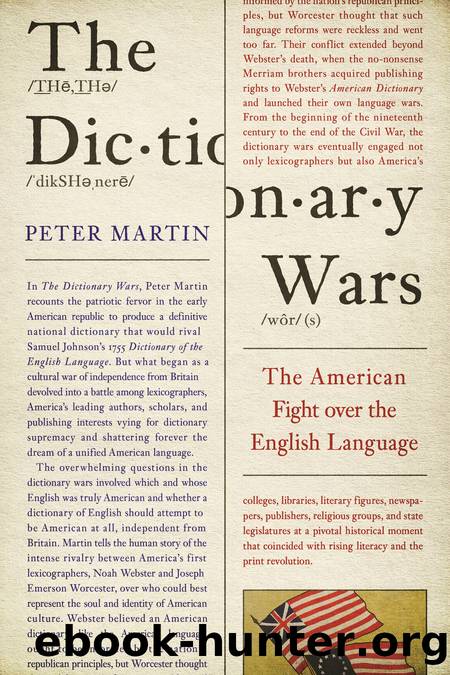The Dictionary Wars by Peter Martin

Author:Peter Martin
Language: eng
Format: epub
Publisher: Princeton University Press
Published: 2019-02-25T00:00:00+00:00
FIGURE 15. The first Merriam edition of Webster’s dictionary, published in 1847–48, advertised Goodrich as editor. Courtesy of the Beinecke Rare Book and Manuscript Library, Yale University, G. and C. Merriam Company Papers.
Goodrich also stresses in the preface the vital role of the edition in clarifying and stabilizing pronunciation. He had opted to continue to use Worcester’s “Synopsis” (mentioned on the title page though not identified there as Worcester’s) as a major authority citing different pronunciations by many distinguished orthoepists in both America and England in cases of disputed pronunciation. But that has now been “completely remodeled,” he adds. The principal authorities are B. H. Smart and Worcester himself, “whose long-continued labors on this subject entitle his decisions to high consideration.” For good measure, the introduction includes a section called “Principles of Pronunciation and Remarks on the Key.” Walker’s Key, though, has been “enlarged and improved,” with more than three thousand words added by English academics in London and Oxford. Not only in the treatment of pronunciation but throughout the entire edition, we can trace an influence straight back to the popularity in America of Worcester’s Critical Pronouncing Dictionary, his preoccupation with pronunciation in his role as chief editor of the original 1829 abridgment, and his prominent use in that octavo of Walker’s Key, which he included in an appendix. The presence of Walker’s Key in this new Goodrich-Merriam edition was tantamount to a major rejection of Webster’s well-advertised early abhorrence of Walker and, as he thought, his negative influence on American speech and spelling.20
As for the orthography, Goodrich included Webster’s both disputed and commonly accepted spellings, explaining that (in the 1841 edition) he had rejected many of Webster’s innovations after twelve years of reflection on the subject following the publication of the 1828 quarto. In 1849, he wrote to the Morning Courier and New York Enquirer, less tactfully than in the preface, openly informing the general public of the stunning news that the orthography in the first Merriam edition of 1847 was “not Webster’s orthography at all” and that in his most recent edition “the most offensive peculiarities of his former system are laid aside; and there is really nothing left which can with any propriety be called his.” While this claim has to be taken with a grain of salt, given the great numbers of contested spellings at play and Goodrich’s stake in convincing the Merriams he was making a clean sweep of them, he was essentially correct. The Webster family may have flinched a little on reading this, but Goodrich was under no illusions about the consequences if he failed in this great purge. The only reason certain American spellings attributed to Webster, such as the s in words like offense and pretense, have survived is that Goodrich allowed them into his 1847 Merriam-Webster edition. As for the ck spellings in such words as frolick, magick, mimick, physick, and traffick, which were regarded as eccentric even in Johnson’s day and were listed as secondary spellings in dictionaries
Download
This site does not store any files on its server. We only index and link to content provided by other sites. Please contact the content providers to delete copyright contents if any and email us, we'll remove relevant links or contents immediately.
| Africa | Americas |
| Arctic & Antarctica | Asia |
| Australia & Oceania | Europe |
| Middle East | Russia |
| United States | World |
| Ancient Civilizations | Military |
| Historical Study & Educational Resources |
Magic and Divination in Early Islam by Emilie Savage-Smith;(1533)
Papillon by Henry Charrière(1433)
Bohemians, Bootleggers, Flappers, and Swells: The Best of Early Vanity Fair by Bohemians Bootleggers Flappers & Swells- The Best of Early Vanity Fair (epub)(1410)
Ambition and Desire: The Dangerous Life of Josephine Bonaparte by Kate Williams(1390)
Twelve Caesars by Mary Beard(1315)
Operation Vengeance: The Astonishing Aerial Ambush That Changed World War II by Dan Hampton(1163)
What Really Happened: The Death of Hitler by Robert J. Hutchinson(1163)
London in the Twentieth Century by Jerry White(1147)
The Japanese by Christopher Harding(1133)
Time of the Magicians by Wolfram Eilenberger(1126)
Twilight of the Gods by Ian W. Toll(1120)
Lenin: A Biography by Robert Service(1076)
The Devil You Know by Charles M. Blow(1026)
A Social History of the Media by Peter Burke & Peter Burke(977)
Freemasons for Dummies by Hodapp Christopher;(965)
Napolean Hill Collection by Napoleon Hill(943)
Henry III by David Carpenter;(919)
The Rise and Triumph of the Modern Self by Unknown(915)
Richard III (The English Monarchs Series) by Charles Ross(909)
